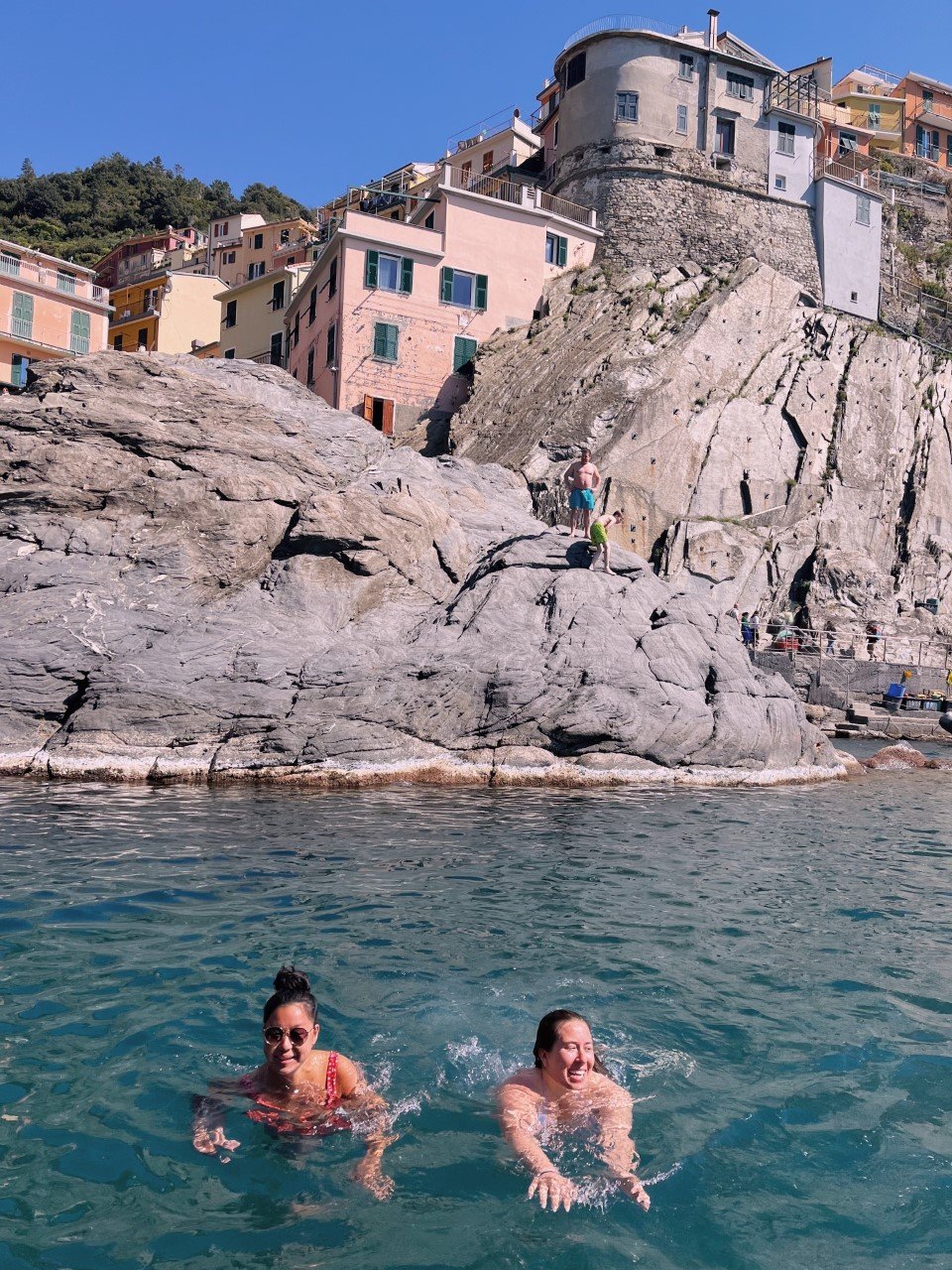The Highs and Lows of Studying Abroad
Marist students open up about the best and worst parts of studying overseas.
Gabrielle Bean '23 in Manarola, Cinque Terre, Italy during her time abroad. Credit: Gabrielle Bean '23
The study abroad experience often sounds like a fantasy vacation filled with postcard-worthy destinations and limitless new horizons.
But for Marist students who make the trek, the experience can present a unique set of challenges and cultural adjustments.
One of the most daunting initial hurdles American students must overcome while studying in a non-English-speaking nation is the language barrier. Gabrielle Bean ‘23 experienced this firsthand while studying in Florence, Italy last spring, as her apartment was located further away from the city center where English was commonly spoken.
Bean noted that most of the eateries near her apartment lacked English-speaking employees, leading to some awkward encounters.
“I guess it was just a lot of, initially, pointing at menus or food in cases and it was kind of embarrassing, but we made it through,” Bean said.
Isabella Cicinelli ‘23 also spent Spring 2022 in Florence dealing with similar hurdles despite possessing some background knowledge of the Italian language. Growing up, Cicinelli took Italian classes in high school and lived with her grandmother, who speaks in a “heavy Italian dialect,” allowing her to act as a translator at times for her roommates.
Her background knowledge was helpful while in Florence, yet it often went out the window when traveling to other countries on the weekends. Visiting 11 countries and over 20 cities over the course of the spring semester brought her to places such as Barcelona, Copenhagen and Paris, where the language barrier was particularly difficult for her to navigate.
Despite the adjustments she had to make, Cicinelli quickly settled in and felt more than comfortable in her new environment. In particular, she cited the “homey” feel of Florence, which she felt was in large part due to its walkability.
“Florence was easily my favorite city. It literally became a second home to me,” Cicinelli said. “The people were so nice. The food was great. We had a lot of fun.”
Becoming accustomed to a new country is not always a given for everyone when studying abroad. Talia Augusto ‘25 can attest to this, as she never quite settled in during her time studying in the Netherlands during Fall 2022.
While she found Amsterdam to be a “lovely city,” the education she received was far more challenging than she had bargained for, going so far as to say that she wouldn’t recommend studying in the Netherlands to anyone. Augusto also found that some people there were “very up front and bold with their statements,” leading to a social adjustment on top of the rigorous academics.
Looking back, Augusto wishes she could’ve pulled more out of the experience.
“I was by myself for pretty much four months and when I was there, Marist didn’t really reach out or anything,” Augusto said. “I thought it was going to be way better than it was.”
Initially fueling her decision to go abroad was a desire to change things up in her life. Coming off of what she described as a “rough” freshman year, Augusto quite literally picked the first destination she saw on Marist’s study abroad list and entered the process blindly.
She advises those thinking of studying abroad to do more preparation beforehand than she had.
“Definitely think why you want to go. Don’t just jump straight into it. Know what you’re getting yourself into before you actually finish the application and go through it,” Augusto said. “There’s nothing wrong with doing things by yourself, but definitely know how the culture is there, what’s the education system like, is [sic] there things to do. Make a pros and cons list.”
Cicinelli, on the other hand, entered the process with a better idea of what to expect. She had already visited Italy twice prior to studying abroad, once with family and once on a high school trip, and loved both experiences.
She also benefited from the knowledge of her two older sisters, each of whom had already studied abroad in Italy. Sure enough, she wound up visiting many of her sisters’ favorite places. She even took some travel recommendations from her Italian grandmother.
“My Grandma always talked about when she lived in Italy how beautiful [Lake Como] was, so that was definitely a place we always wanted to check off our bucket list,” Cicinelli said.
Also benefiting from travel during her high school years was Bean, who spent three weeks in China on a trip prior to college. Feeling inspired to see other parts of the world in the wake of her trip, she chose to take advantage of Marist’s sister campus and “incredible” abroad program.
Gabrielle Bean '23 skydiving in Interlaken, Switzerland during her study abroad experience of Spring 2022. Credit: Gabrielle Bean '23
For Bean, getting into a consistent routine helped her adjust to life overseas. Above all, she believes the experiences she had while studying abroad pushed her out of her comfort zone and made her become a more independent person.
Aside from the personal growth she achieved in Florence, Bean believes her decision to study abroad was worth it because of the unforgettable memories she made and the lasting relationships she formed.
“I obviously went with people that I knew, but I was able to meet so many new people that I had mutual friends with,” Bean said. “Now those [people] are some of my best friends because obviously, we were in such a crazy place doing crazy things together. That would not ever happen in Poughkeepsie.”
Overall, living overseas for a long duration of time can be difficult, but it can also be one of the most incredible experiences.

